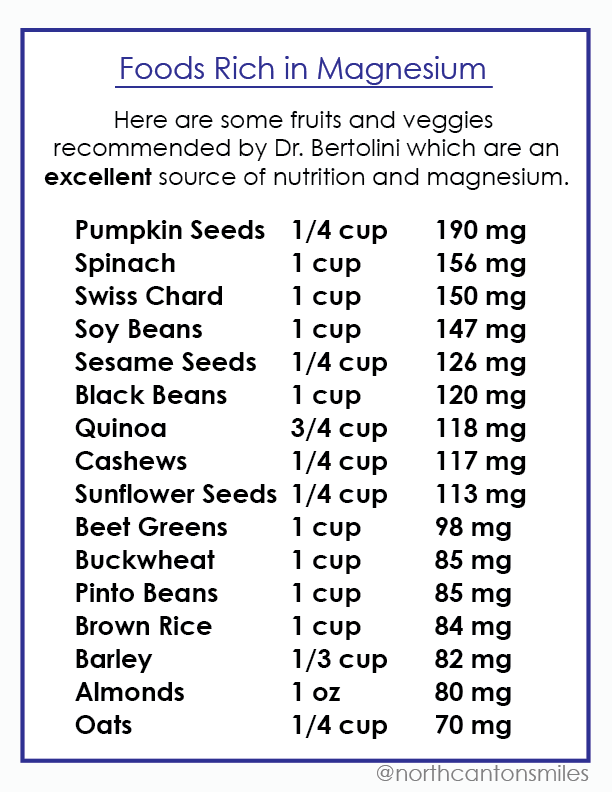Sufficient Magnesium For Optimal Health
Calcium and magnesium are necessary for a healthy body, especially your teeth and bone health. Less than 30% of adults get the recommended daily allowance of magnesium.
Magnesium works with calcium to regulate electrical impulses in your cells. If the ratio of calcium is higher than magnesium it will cause cell dysfunction. A good supply of magnesium is also necessary for proper nerve function.
Signs of a minor deficiency of magnesium
- Painful muscle spasms
- Muscle cramps
- Facial tics
- Eye twitches
- Involuntary eye movements
- Anxiety
- Times of hyperactivity
- Difficulty getting to or staying asleep
How does this concern our teeth?
If we are not getting sufficient magnesium from our diet, it doesn’t matter how much calcium we consume. Our teeth are only able to form hard enamel if adequate amounts of magnesium are available. Researchers have found that even a minor ongoing deficiency of magnesium can lead to a significant amount of bone loss. Your teeth and bones hold 50-60% of the magnesium found in your body, so you can see the importance of sufficient amounts for whole-body health.
Sufficient magnesium is for proper function and survival.
You could be at risk for a magnesium deficiency if:
- You drink carbonated beverages on a regular basis. This then adds large amounts of phosphates to your system. Phosphates bind to the magnesium in your digestive tract and flush it out of your body.
- You drink caffeinated or alcoholic beverages daily, which stimulates your kidneys to excrete extra magnesium.
- You eat refined sugars and sweets regularly, which causes your body to excrete magnesium through the kidneys.
- You are often under physical and emotional stress. This causes magnesium to move from your cells into your bloodstream to help you feel both energized and calm in a stressful situation. This depletes your magnesium stores which then magnifies the stress you feel because your body can’t send more magnesium to calm the situation.
- You take prescription drugs such as diuretics, heart medications, asthma medication, birth control pills, or estrogen replacement therapy which can reduce magnesium levels in your body.
- You take calcium supplements without magnesium or if you take too much calcium it can have a negative effect on your magnesium levels.
- You are obese or have high blood sugar. This can also adversely affect your magnesium levels.
What can you do to prevent a magnesium deficiency?
We’ve compiled a list of foods high in magnesium to help get you on your way to total health.

Foods that are most beneficial are dark leafy vegetables, legumes, nuts, seeds, and whole grains. Make these foods a part of your daily diet to lower your risk of a magnesium deficiency.

